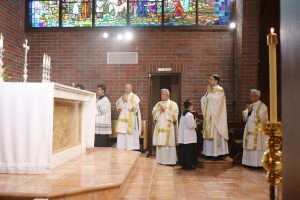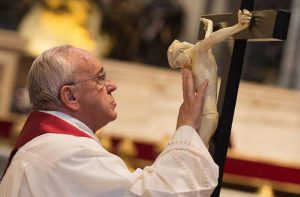Fr. James Mallon once described an image I’ve never forgotten: Imagine we go home and find our 25-year old son sitting on the couch sucking his thumb. Now he’s in his right mind, but just likes sucking his thumb—this would be very sad. In case some disagree with this, go for a job interview, suck your thumb, and see if they hire you. No one tolerates this level of immaturity in adults. “Why, then, do we have such tolerance for lifelong Catholics who are stuck in such a place spiritually?” (Fr. James Mallon, Divine Renovation, 81).
Three weeks ago, we talked about how Jordan Peterson is resonating with millions of people because he’s challenging them to be more mature, take responsibility for their lives, and grow up. This principle also applies to the spiritual life, because we all start off spiritually young, but have to mature.
St. Paul says today: “The gifts he gave were that some would be Apostles, some Prophets, some evangelists, some pastors and teachers, to equip the saints for the work of ministry, for building up the body of Christ, until all of us come to the unity of the faith and of the knowledge of the Son of God, to maturity” (Eph 4:11-13). In other words, all the ministries of the Church are designed to bring us to spiritual maturity. He talks about maturity at least six other times in his letters (1 Cor 2:6; 3:1-4; 14:20; Phil 3:12-15; Col 1:28; 4:12).
Now, let’s just focus on one part of what he mentions: maturing in our knowledge of Christ. He’s urging us to know Christ better otherwise our “minds will remain childish… and vulnerable to… novelties… contrary to the Gospel” (Ignatius Catholic Study Bible, 350).
For example, when we’re spiritually young, we tend to  have a vague notion of God: We say something such as, “God’s everywhere,” which is partially true. However, if we study the Bible and philosophy more deeply, we realize that God exists outside the universe, outside of time, has no body—He’s what we call transcendent. So, this microphone is not God. You are not God. I’m not God (even though many little children point at priests and say, “Jesus.”)
have a vague notion of God: We say something such as, “God’s everywhere,” which is partially true. However, if we study the Bible and philosophy more deeply, we realize that God exists outside the universe, outside of time, has no body—He’s what we call transcendent. So, this microphone is not God. You are not God. I’m not God (even though many little children point at priests and say, “Jesus.”)
Philosophy also tells us that God is immanent, meaning He’s present among us. He supports all things in existence, because if He didn’t, they wouldn’t exist; He also knows and cares for all things (Msgr. Paul J. Glenn, A Tour of the Summa, 10).
As we grow spiritually, we need to understand that God’s bigger than ourselves, He deserves our love and worship; we can’t control Him and we don’t make the rules. Nevertheless, at the same time, He’s present among us, loves us and wants us to encounter Him. Here’s a beautiful one-minute video from Bishop Barron on transcendence and immanence.
In order for us to grow in our knowledge and love of Jesus, we need to have a ‘wow’ reaction to Him, but also a sense that He’s close to us.
Therefore, there’s one thing we’re going to start doing during the weekday Masses and on the first Sundays of the month: The servers, Deacon Andrew and I are going to face the same direction as you when we’re talking to God during Mass; and whenever I talk to you, I’ll face you. This posture is called, “ad orientem,” meaning in Latin, “to the East.” With the full support of Archbishop Miller, we’ve already been doing this at Mass every Friday and the reception has been positive; and many other parishes around the world are doing this.
Now, let’s clarify a few things. In this church, it’s true that we’ll all be facing West, but we say ‘liturgical East’ because the early Christians faced East, the direction of the rising sun, from where they were looking for Christ to return.
This also does not mean the priest has his back to the people—that’s a sociological interpretation and has never been the way Christians see this. For the vast majority of Church history, this is the way Christians celebrated Mass.
Nor does this mean that we’re going backwards in time and everything’s going to be in Latin. Here at St. Anthony’s we do many activities that are modern, such as videos during the homily, welcome announcements before Mass, modern music, Alpha in a café, Name Tag Sundays, etc.
The question for every change always is: Does this help us grow in holiness and mission? Facing “ad orientem” will help us grow in our knowledge and love of Christ in three ways:
 1) Since we’re all facing the same direction, it becomes clear that the whole community, including the priest, deacon and servers, are united on a pilgrimage, looking towards God, Jesus and heaven. Today is the solemnity of Jesus’ Ascension, and the opening prayer tells us that “where the Head has gone before in glory, the Body is called to follow.” Did you ever notice that, when we prayed the Prayer for the Parish Centre Campaign, the servers and I would go out into the aisle to join you? I loved this because I felt as if I was joined with you in praying to our Father.
1) Since we’re all facing the same direction, it becomes clear that the whole community, including the priest, deacon and servers, are united on a pilgrimage, looking towards God, Jesus and heaven. Today is the solemnity of Jesus’ Ascension, and the opening prayer tells us that “where the Head has gone before in glory, the Body is called to follow.” Did you ever notice that, when we prayed the Prayer for the Parish Centre Campaign, the servers and I would go out into the aisle to join you? I loved this because I felt as if I was joined with you in praying to our Father.
2) When we face this direction, it reminds us that God is beyond our world. This symbolism is consistent, because one of the reasons why, after Vatican Council II, the priest faced the people is because it was focusing on the fact that God is present right here, on this altar, which is a legitimate point. However, one thing we’ve lost after Vatican Council II is the sense that God is majestic and heavenly. We need to regain our sense of wonder and awe!
Nevertheless, at the same time, the human person has a need to be close to God. That’s why He gave us the Eucharist, which is Jesus truly present. That’s why every first Saturday, we have Praise and Worship during adoration, where people are allowed to come into the sanctuary and pray right before the King of kings, the Lord of lords. But they must do so with absolute respect, taking off their shoes and kneeling on both knees (I look forward to the time when we can do this every week!). That’s also why we have the adoration chapel, where we go up close to Jesus and sit at His feet (Cf. Lk 10:39).
3) One of the most practical reasons for this change is because most people aren’t aware when the priest is speaking to them and when to God. Now this becomes clear when we see the priest face the people and when we see him turn around and face God. The priest is a mediator between God and the people: He brings people to God and God to the people.
And that’s the way it has to be with you: You turn to God in prayer, and then, when you turn around and leave the church, you have to love your neighbour.
I would ask for trust as your priest that this will help us grow in holiness and mission. We cannot get complacent as a parish; we must have the courage to grow. We’ve grown so much horizontally, in terms of Alpha, hospitality, Works of Mercy, Name Tag Sundays, Faith Studies, but we also have to grow vertically, in terms of our love of God.
This is a great compliment to all of you, because you’re spiritually ready for this. I’ve been thinking about this for a long time, and I wouldn’t do it unless you were ready.
Today, when we start the Eucharistic prayer, be aware of where we’re going: We’re all going to God. Be aware of whom you’re talking to: Are you responding to me in dialogue, or are you talking to the Father? Focus on the crucifix. Focus on what you’re placing on the altar.
Please let me know what you think, because I always want to hear feedback. There are cards in your pews that outline the reasons we just mentioned—please use them during Mass and ponder the reasons.
Finally, think about this: Have you ever gone up a mountain and taken in a breath-taking view? Or looked up at the night sky and seen the thousands of stars that are light-years away? We humans are so small, and God is so immense. If we have this reaction on a mountain or looking out onto the ocean, then we should have the same sense when we come to Mass. The silence, the environment, the music, the smells, the vestments should all tell us that there is something heavenly going on here: The Creator of the whole universe wants to have a relationship with me. Knowing both is part of spiritual maturing.